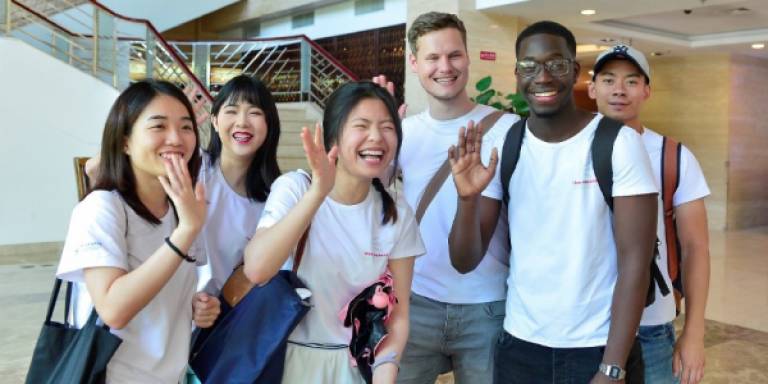Zhejiang University International Summer School
19 March 2019
Masamba from Economics was awarded one of our tuition fee free places on the International Summer School at Zhejiang University. Read all about his experiences on the entrepreneurship and business programme in Hangzhou.

Monika Kovacheva, Comparative Literature
How to describe China in one word? Magical. In every sense of the word – it was unexpected, unpredictable, but most of all - enchanting. I am not exaggerating when I say that China is not like anything I have ever seen.
I am a second year BA Comparative Literature student (currently on my Year Abroad in Berlin), interested in travelling, exploring different cultures and also entrepreneurship. And before I continue raving about the memories we made in China, I am going to give you an overview of the program.
I attended the International Business Summer School at Zhejiang University in Hangzhou. The academic side of the course consisted of two-hour lectures in the morning, which explored the different aspects of the creation and implementation of a successful business plan. Most valuable and unique I found the lectures, which explored in-depth the business market specifically in the context of Chinese culture and environment. This insight into doing business with China, a country which is and certainty will remain on the frontier of the business world, is something that no other course, especially outside of China can give you. My favorite lecture was focused on an insight into the cultural and communicational differences between the West and the East, and important points we need to take into account, when doing business in the Chinese market. More than I had realized before, China is a country, which is governed by it’s own internal rules and norms, which are different from those in the West.
In the afternoon we either had free time to explore the city, and around it (Did anyone say a spontaneous trip to Shanghai?), had activities to experience the Chinese culture (including the Food Museum, Chinese calligraphy and a thai-chi class), or my personal favorite – company visits. We soon learned that Hangzhou is considered a entrepreneurial hub in China due to the legacy of Jack Ma, founder of Alibaba, whose headquarters are in Hangzhou, and which we, of course, visited! The company visits were very inspirational, and allowed us to see the practical realization of all those ideas we discussed each morning. The culmination of our educational experience was the creation and presentation of a business plan, developed to suit the Chinese market.
It is hard to pin point the highlights of this three-week adventure. One of the most memorable sights was definitely the Lingyan Temple, which consists of a beautiful park, where you can walk through mountain caves with ancient Buddha carvings, and a temple complex. We went to the temple very early in the morning, before most tourists and were able to feel the authentic atmosphere of the place. This image of traditional China, full of vibrant colors, mythical creatures and rituals, was radically contrasted by the modern industrial appearance in places like Hangzhou’s business centre, or Shanghai. Climbing to the 80th floor of a Shanghai skyscraper is not for the lighthearted. We visited the Jinmao Tower, which does not only give you a bird eye view of Shanghai, but also gives you an insight look of how high you are standing. The structure is hollow inside, and you can stand on a balcony looking 40 floors down.
Some things you need to take into account before travel is that a lot of websites or apps are restricted by the government, but there are Chinese alternatives you can use. Also, the language barrier is something you should not underestimate, and I would advise you if you like me had zero experience in Mandarin, to not buy a phrase book, thinking that you will be able to pick up and casually use a few phrases, instead download multiple translation apps. Luckily there were people in the program, who spoke Chinese and helped us out a lot, and ordered the most delicious food for us. Another thing that we found the hard way is that when you travel by train, you still need your passport in order to validate your ticket. Nevertheless, you should remember to bring a lot of cash since not all ATMs accept foreign cards.
Simply said, the short-term mobility exceeded my expectations: I gained a very interesting, and I believe, useful insight into ‘doing business with China’, and I was able to travel independently after the program, all of which gave me a new and unique perspective to consider.
 Close
Close

